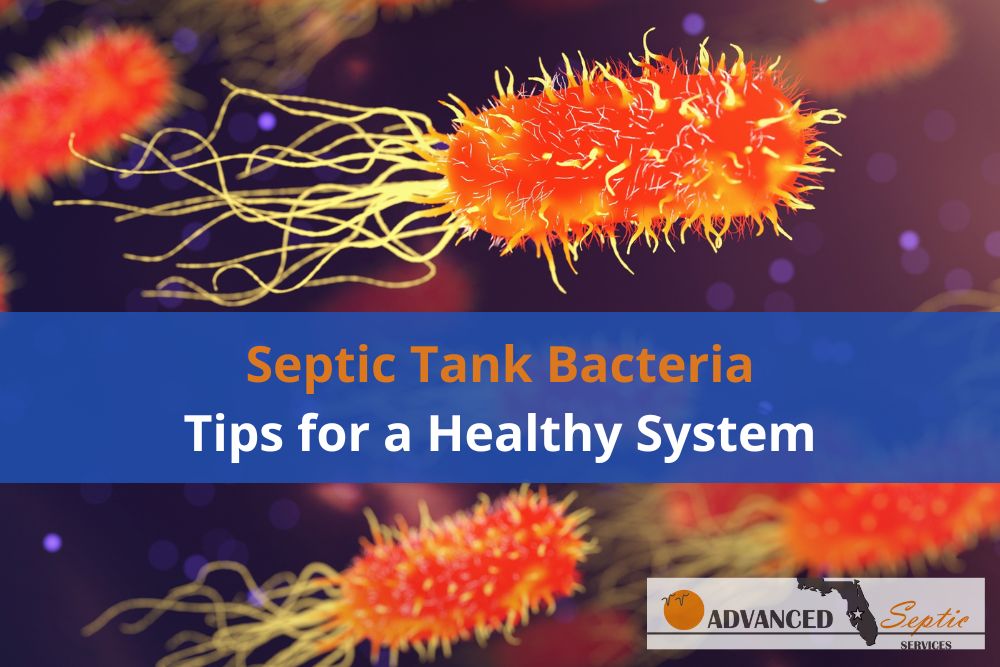
Septic tanks play a crucial role in the proper disposal of wastewater for many homes and businesses in Florida. These underground systems rely on a delicate balance of bacteria to break down solid waste. The septic tank bacteria purify the water before it seeps into the soil through the drain field, ensuring the optimal functioning of a septic tank.
But septic tank bacteria are fragile and easily disrupted. Here’s a few ways you can keep your septic tank bacteria happy, healthy, and thriving so you don’t have to worry about your septic system.
Septic Tank Bacteria – Tips to Keeping Your System Healthy
Be Mindful of Household Chemicals
The types of chemicals used in your household help you eliminate bacteria in your home — and the septic tank bacteria. Harsh chemicals such as bleach, disinfectants, and strong detergents can kill off the beneficial bacteria responsible for breaking down waste.
Whenever possible, opt for environmentally friendly and septic-safe cleaning products. Look for labels that indicate they are biodegradable or specifically designed for use with septic systems.
If you prefer name-brand and bleach-based cleaning products, we understand. We all love a clean house. Just make sure to use sparingly and to not over use in order to protect your septic tank.
Regular Pumping and Inspection
Regular pumping and inspection of your septic tank help maintain a healthy bacterial balance. Over time, solid waste and sludge can accumulate in the tank, leading to a decreased capacity for the bacterial population and a skewed ratio of waste to waster consumers.
Contact your local septic company every three to five years to pump out the accumulated waste. Ask about an inspection schedule as well. Because your system is underground, it is difficult to identify issues and needed repairs. Inspections can help you stay on top of your septic maintenance.
Water Conservation
Conserving water in your household not only helps the environment but also aids in maintaining your septic tank bacteria in doing their job. Excessive water usage can overwhelm the septic system and the natural processes in place.
What does attainable water conservation look like? Spread out water usage throughout the day instead of doing multiple loads of laundry or taking long showers consecutively. Quickly fix any leaks throughout the home. You don’t have to give up using water, just use it differently.
Proper Waste Disposal
Your septic system is not a trash can, and should be treated as such. Avoid flushing non-biodegradable items, such as cigarette butts, diapers, feminine hygiene products, “flushable” wipes, grease and oils and/or excessive amounts of toilet paper, down the toilet. These items can clog the system, interfere with the bacterial breakdown process, and lead to septic tank failure.
Use trash cans for disposing of such items and encourage everyone in your household to follow proper waste disposal practices. If it’s not waste or toilet paper — do not flush it.
Add Bacterial Supplements
In some cases, adding bacterial supplements can help maintain a healthy balance of septic tank bacteria. These supplements are available in various forms, including liquid or powder, and are specifically designed to introduce beneficial bacteria into the septic system. They aid in enhancing the natural bacterial activity and can be particularly useful experiencing issues with a low bacterial count. Consult with a septic professional to determine the appropriate type and dosage of bacterial supplements for your specific septic tank.
Maintaining a Healthy Septic Tank
Maintaining a healthy balance of bacteria in your septic tank is crucial for its optimal performance and longevity. By being mindful of the household chemicals you use, regularly pumping and inspecting the tank, conserving water, practicing proper waste disposal, and considering bacterial supplements when necessary, you can ensure the efficiency and functionality of your septic system.

